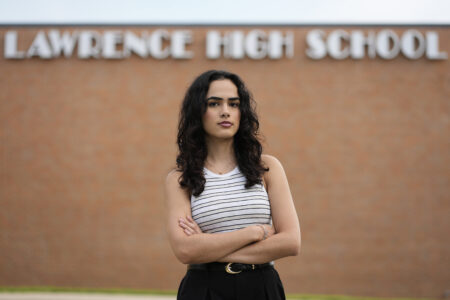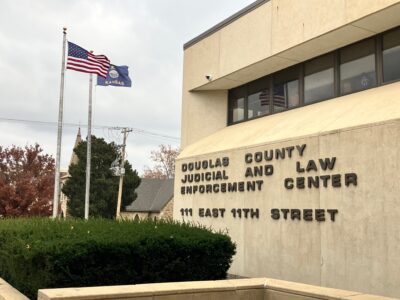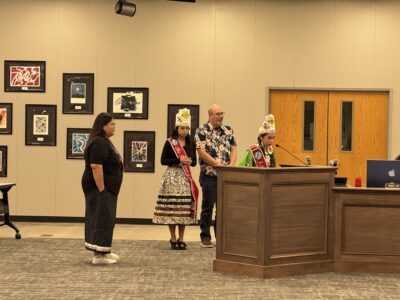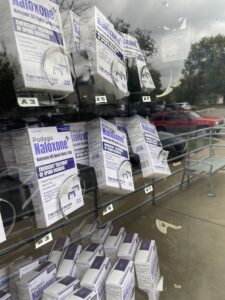Student journalists allege Lawrence High School officials tried to prohibit coverage of Gaggle lawsuit in school newspaper

photo by: AP Photo/Charlie Riedel)
Natasha Torkzaban stands outside Lawrence High School, where she and other students have filed a lawsuit against the school district's use of digital surveillance software, Sunday, Aug. 3, 2025.
Student journalists at Lawrence High allege that school officials attempted to block coverage of a lawsuit — filed by their peers — challenging the district’s use of AI surveillance software.
The lawsuit was filed by nine current and former Lawrence and Free State High School students, and it alleges that the Lawrence school district has been violating their First Amendment rights via a third-party artificial intelligence software known as Gaggle. The software monitors the use of district-issued computers, and the students said it has resulted in illegal searches of the digital files they produce.
According to a motion that was filed by the students’ attorneys on Friday, Quentin Rials, the principal of Lawrence High School, allegedly issued a directive to the school’s newspaper, The Budget, and its student reporters to not report on the lawsuit.
The students’ motion requested an emergency temporary restraining order and a preliminary injunction to prohibit the Lawrence school district from “directing, pressuring, coercing, or encouraging any student journalist or journalism adviser to refrain from lawful reporting on this lawsuit.” In addition, it would prohibit the district from taking or threatening employment action against journalism adviser Abbi Epperson-Ladd.
On the morning of Aug. 14, The Budget’s editor-in-chief was allegedly informed by Epperson-Ladd that Rials had instructed her that neither The Budget nor its student reporters were allowed to cover the lawsuit. Epperson-Ladd also heard the same directive from an individual she believed to be a district administrator, the motion said.
The editor-in-chief told Epperson-Ladd that she intended to report on the lawsuit and related Gaggle coverage, but Epperson-Ladd told her not to report, and said “the District told me ‘no,’ and I don’t want to go against that.”
Rials later lifted the directive prohibiting coverage of the lawsuit, stating that student journalists at The Budget were free to report on Gaggle without limitations. Following this, the editor-in-chief prepared a story about the lawsuit for publication the next day.
However, before the article was published, the editor met with teachers union representative Jeff Plinsky — at the suggestion of Epperson-Ladd — to “suggest other options besides publishing.”
“Epperson-Ladd stated she was ‘very concerned’ … and wanted to be careful,” the motion said. “(The editor) understood this to mean that administration was pressuring Epperson-Ladd to quash the story or face adverse consequences.”
Plinsky told the editor-in-chief that they have “constitutional rights to do what you want to do,” but he urged them to “keep in mind that a young teacher with no due process protections … could (be) fire(d) … tomorrow for no reason,” the motion said. He explained that “for the first three years of a teacher’s contract, they do not have to give a reason to fire a teacher.”
The motion cites that Kansas is one of 18 states that has laws specifically prohibiting the censorship of student journalists. The Kansas Student Publications Act, enacted in 1992, safeguards the press freedom of student journalists in Kansas public schools. It grants them the right to control the content of their publications without interference from school officials, except in cases where the material is libelous, slanderous, obscene, or significantly disrupts the school day.
District Judge Kathryn H. Vratil denied the request for a temporary restraining order, noting that the school district had already lifted the publication ban and that Kansas law protects journalism advisers from retaliation for supporting student media. However, she postponed a decision on the preliminary injunction until the Lawrence school district had been formally served and given an opportunity to respond.
Gaggle has flagged over 1,200 incidents for the school district in a recent 10-month span, but school officials determined that nearly two-thirds were nonissues — including more than 200 false alarms triggered by student homework, as the Journal-World reported.
Superintendent Jeanice Swift told the Journal-World via email on Thursday evening that the district would not comment on pending litigation, but she also said journalism students “are not restricted in any manner from reporting on topics of interest.”
“No school or district official will prohibit, delay, condition or otherwise restrain any student journalist or journalism adviser from lawful reporting on any subject,” Swift said via email.







